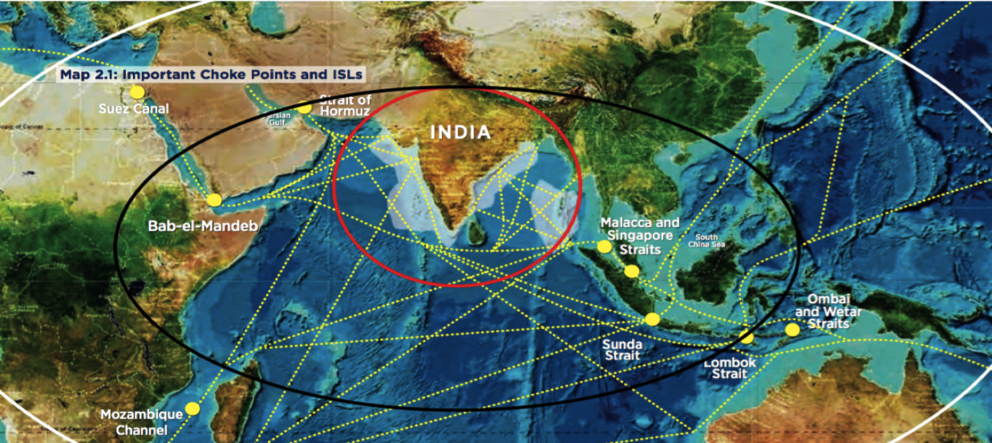December 31, 2023 Reading Time: < 1 minute

Reading Time: < 1 min read
Ravinatha Aryasinha
Executive Director at Lakshman Kadirgamar Institute of International Relations and Strategic Studies
Abstract: The paper discusses the impact of major power rivalry in the Indian Ocean Region and assesses the foreign policy challenges for Sri Lanka. Drawing on a presentation made at the Regional Centre for Strategic Studies (RCSS) Regional Conference on ‘Ocean Security: South Asia and the Indian Ocean’ – 16 October 2023, it reviews the associated dynamics, identifies the flashpoints, and suggests modalities that could help Sri Lanka overcome the predicament of becoming a battleground for confrontation between the major powers.
ඉන්දියාව, චීනය සහ ඇමරිකා එක්සත් ජනපදය යන ත්රිත්වයේ භූමිකාවට අවධානය යොමු කරමින් ඉන්දියානු සාගර කලාපයේ ප්රධාන බල එදිරිවාදිකම් හේතුවෙන් ශ්රී ලංකාව මුහුණ දෙන විදේශ ප්රතිපත්ති අභියෝග පිළිබඳව මෙම පර්යේෂණ අධ්යනය සාකච්ඡා කරයි. ආශ්රිත ගතිකතාවයන් සමාලෝචනය කිරීමෙන් තර්කකල හැක්කේ, මෑත කාලයේ දී, ශ්රී ලංකාව සිය විදේශ ප්රතිපත්තිය තුළ දැඩි ලෙස නොබැඳි/මධ්යස්ථ ප්රවේශයක් අනුගමනය කර ඇති අවස්ථාවන්හි පවා විවිධ සන්ධාන හා පාර්ශව මගින් නිරන්තර ශ්රී ලංකාව වෙත බලපෑම් එල්ල කර ඇත්තේ, බල අරගලයක කොටස්කරුවෙකු වීමටය. ප්රධාන බලවතුන් අතර ගැටුමක් සඳහා ඉත්තෙකු වීමේ දුෂ්කරතාවයෙන් මිදීමට ශ්රී ලංකාවට උපකාරී වන ක්රමෝපායන් මෙම අධ්යනය යෝජනා කරයි.
இந்தியப் பெருங்கடல் பிராந்தியத்தில் – இந்தியா, சீனா மற்றும் அமெரிக்காவை மையமாகக் கொண்ட பெரும் வல்லரசு போட்டியிலிருந்து எழும் இலங்கை எதிர்கொள்ளும் வெளியுறவுக் கொள்கை சவால்கள் குறித்து கட்டுரை விவாதிக்கிறது. இதனுடன் தொடர்புடைய இயக்கவியலை மறுபரிசீலனை செய்து, ஒளிரும் புள்ளிகளை அடையாளம் காணும்போது, இலங்கை எதிர்கொள்ளும் உண்மை என்னவென்றால், சமீப காலங்களில், இலங்கை தனது வெளியுறவுக் கொள்கையில் கண்டிப்பாக அணிசேரா/நடுநிலை அணுகுமுறையை கடைப்பிடித்த சந்தர்ப்பங்களில் கூட, சம்பந்தப்பட்ட நாடுகள் மற்றும் அதன் கூட்டணிகள் இலங்கைக்கு ‘Zero-Sum’ சூழலில் செயல்பட அழுத்தம் கொடுத்துள்ளன. 16 அக்டோபர் 2023 அன்று ‘கடல் பாதுகாப்பு: தெற்காசியா மற்றும் இந்தியப் பெருங்கடல்’ என்ற தலைப்பில் மூலோபாய ஆய்வுகளுக்கான பிராந்திய மையத்தின் (RCSS) பிராந்திய மாநாட்டில் செய்யப்பட்ட விளக்கக்காட்சியை வரைந்து, நாடகமாக மாறும் இந்த இக்கட்டான சூழ்நிலையை இலங்கை சமாளிக்க உதவும் வழிமுறைகளை கட்டுரை பரிந்துரைக்கிறது. பெரும் சக்திகளுக்கு இடையேயான மோதலுக்கு.